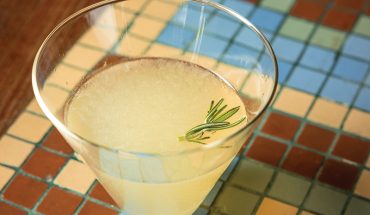Cocktail culture gets the classroom treatment at The Bittery
by Catherine Currin
photography by Taylor McDonald

Head south down Davie Street, and you can’t miss the bubble-gum-pink building that’s home to The Bittery. Husband-and-wife team Craig Rudewicz and Lindsay Lasserre founded Crude Bitters in 2012, the first bitters company in North Carolina, and have since expanded to sell in 40 states, as well as Australia. “The North Carolina beer industry had expanded like crazy, and cocktail culture was growing,” says Rudewicz. “We wanted to be involved in the industry and provide a product to showcase cocktails in general. Cocktail history is a passion of ours and bitters are intertwined throughout its culture.”
To many, the world of bitters is opaque: Those mysterious dropper bottles look medicinal, and what’s in there, anyway? In fact, the potent liquid—it’s technically deemed a food product—began as a healing remedy in the 1800s. Intended to aid in digestion, the highly concentrated spirits were infused with herbs, spices and other botanicals. Today, bitters have become “the salt and pepper of the cocktail world,” says Rudewicz, enhancing the nature of a standard liquor cocktail. “Our bitters specialize in blends of flavors, rather than single flavors, so we try and think of combinations that would complement a certain spirit or cocktail.”
Crude Bitters has a concoction for virtually everyone, with names like ‘Bitterless Marriage,’ a blend of hibiscus, lavender and oak; ‘Rizzo,’ a combination of rosemary, grapefruit and peppercorn (Rudewicz says it’s great with tequila) and a hot pepper blend called ‘No No,’ with guajillo, habanero, and local heat Carolina reaper. “Once we craft a flavor and it becomes popular enough, we give it a name and make it a year-round offering,” says Rudewicz. Most of their blends are named in honor of past and present pets.

The former dentist’s office on the corner of East and Davie Streets lends for an odd layout (see: tiny exam rooms along a narrow hallway), but Lasserre and Rudewicz have filled the shelves with unique cocktail accessories, from fancy jiggers and mixing spoons to festive tiki mugs and coupe glasses. Not into cocktails? There’s a nonalcoholic tasting bar where you can sample their mainstay and seasonal flavors, or order a seltzer with bitters. And while the couple promotes their own wares, they also support other makers, like Charleston’s Bittermilk and the classic Angostura, founded in 1824. “The Bittery is also a way to showcase other small-batch bitters and cocktail ingredients. If someone needs an ingredient for a good cocktail, we want to help them out.”
Rudewicz and Lasserre also teach classes at The Bittery a few times a month, to help participants learn how to use bitters in order to complement classic cocktails like an Old Fashioned or Negroni. “We try to educate the public about our products, but also on the origin of a cocktail and bitters usage,” says Rudewicz. During a class, guests will have a crash course on the history of bitters, sample cocktails topped with the in-house mixtures and have a chance to shop the quirky store. Rudewicz says he hopes we learn to treat our cocktail menu like our food menu, asking questions before ordering something we aren’t sure of. “Mixing drinks is a lot like cooking, you can learn with flavors pair well together,” says Rudewicz. “Our goal is to get you experimenting like a chef.”



